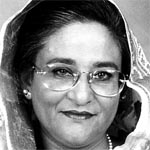Hasina looks for a second chance to serve Bangladesh
 Dhaka - Scion of a political family, Sheikh Hasina Wajed has been devoted to politics since her student days, becoming the symbol of unity within her party and among her supporters.
Dhaka - Scion of a political family, Sheikh Hasina Wajed has been devoted to politics since her student days, becoming the symbol of unity within her party and among her supporters.
The 62-year-old leader is an iconic figure in the Awami League, the party her father established half a century ago and which led the country to its independence.
Born on 28 September 1948 in a remote village of Tungipara, 103 kilometres south-west of Dhaka, Hasina has experienced many ups and downs.
She served as prime minister for five years from 1996 and as leader of the opposition in parliament for many years. Now she is seeking a second chance to serve the nation in Monday's elections, for which she has an ambitious agenda targeting a prosperous Bangladesh by 2021.
Hasina has been jailed many times and has brushed with death several times in a political career which she began afresh on her return from exile in 1981, vowing to carry out the struggle to establish rights of the impoverished country's poorest.
The daughter of the founder of Bangladesh Sheikh Mujibur Rahman, who was assassinated in a military putsch in 1975, she vowed on her return from exile to follow her father's path.
"The poor countrymen are my relatives as I have lost almost everyone - parents, brothers and relatives - in 1975. I will continue fight to establish rights of the people," she tells voters.
A Dhaka University graduate in Bengali literature, Hasina married eminent scientist M. A. Wajed Miah in 1968. They have a son - Sajib Wajed Joy, a computer engineer living in USA - and a daughter, Saima Wajed Putul, living in Canada.
Hasina actively participated in the mass upsurge of 1969 against the then Pakistan government at the time of Bangladesh's Liberation War of 1971, and was imprisoned by Pakistani occupation forces along with her husband, mother, sister and brother.
As she was on a visit to Germany, Hasina survived the 15 August 1975 massacre when a section of disgruntled army officers assassinated her father, Sheikh Mujibur Rahman, his wife, three sons and all the inmates of his residence.
The officers' ploy was to eliminate the entire family, according to many historians. Hasina was elected unanimously president of the Awami League while in exile, as Mujib's political heir.
Six years after the assassination of her father, she went back home on 17 May 1981 as the government lifted restrictions on her return.
Tens of thousands accorded a reception to the young leader who on her arrival told the crowd: "I have nothing to lose. I pledge you to fight for restoration of the democratic rights of the people of my country."
But Bangladesh's political scenario changed once again with the assassination of President Ziaur Rahman in a coup in 1981, and a military takeover by Hussein Muhammad Ershad in 1982.
Hasina was the first to publicly protest against an assumption of state power through military coups in Bangladesh. For that she had to suffer confinement several times during Ershad's dictatorship.
Hasina took part in the 1986 general elections, arranged by the military government, to bring to an end to the politics of taking power at gunpoint.
Defeated in that election, she sat on opposition benches and mobilised opinion against the dictatorship both in the House and on the streets.
She led a seven-party combine and launched a joint movement with her political rival to dislodge Ershad, who finally stepped down on December 6, 1990.
The Awami League returned to power in Bangladesh after many years in the opposition, making Hasina prime minister for the first through the 12 June 1996 elections.
Assuming office, she took the initiative to bring the killers of her father Mujib to justice, repealing an indemnity ordinance that kept the trial prohibited.
In her five-year term she achieved food autarky for the poor nation of 140 million people. But her party was defeated in the 2001 elections on her failure to ensure public security.
Hasina narrowly escaped Islamist militants' grenade attacks at a rally in 2004 that left at least 24 of her party supporters dead.
A power struggle between Hasina's Awami League and Khaleda Zia's Bangladesh Nationalist Party led the nation towards confrontation. The mistrust and political instability paved ways for military to intervene in 2007, forcing a prolonged state of emergency.
As part of a ploy to keep Sheikh Hasina from the politics, a quarter in the military-backed government was barred from travelling to Bangladesh from the US.
However, she managed to come back, but the army-led joint forces detained her on corruption charges on 16 July 2007.
She was released from the jail nearly year afterwards last June 11 as part of political negotiations, and is now running campaigning to return the country to democracy. (dpa)